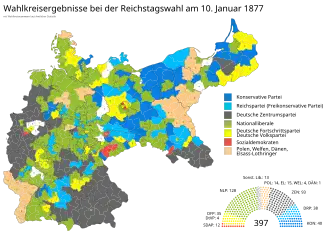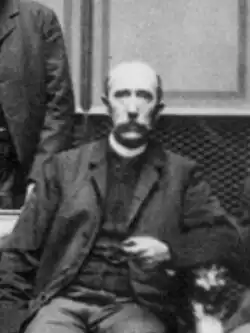1877 German federal election
| |||||||||||||||||||||||||||||||||||||||||||||||||||||||||||||||||||||||||||||||||||||||||
All 397 seats in the Reichstag 199 seats needed for a majority | |||||||||||||||||||||||||||||||||||||||||||||||||||||||||||||||||||||||||||||||||||||||||
|---|---|---|---|---|---|---|---|---|---|---|---|---|---|---|---|---|---|---|---|---|---|---|---|---|---|---|---|---|---|---|---|---|---|---|---|---|---|---|---|---|---|---|---|---|---|---|---|---|---|---|---|---|---|---|---|---|---|---|---|---|---|---|---|---|---|---|---|---|---|---|---|---|---|---|---|---|---|---|---|---|---|---|---|---|---|---|---|---|---|
| Registered | 8,943,028 | ||||||||||||||||||||||||||||||||||||||||||||||||||||||||||||||||||||||||||||||||||||||||
| Turnout | 5,422,647 (60.64%) | ||||||||||||||||||||||||||||||||||||||||||||||||||||||||||||||||||||||||||||||||||||||||
| |||||||||||||||||||||||||||||||||||||||||||||||||||||||||||||||||||||||||||||||||||||||||
 Map of results (by constituencies) | |||||||||||||||||||||||||||||||||||||||||||||||||||||||||||||||||||||||||||||||||||||||||
| |||||||||||||||||||||||||||||||||||||||||||||||||||||||||||||||||||||||||||||||||||||||||
| This article is part of a series on the |
| Politics of Germany |
|---|
 |
A federal election for the third Reichstag of the German Empire was held on 10 January 1877.[2] It was a regularly scheduled election based on the three-year legislative period established in the imperial constitution. The voting was strongly influenced by the economic downturn that had followed the Panic of 1873. Conservative, protectionist parties and, to a lesser extent, social democrats gained seats at the expense of liberal and free trade parties, particularly the National Liberals
Historical background
The sharp economic downturn that began in late 1873 significantly affected the 1877 Reichstag election. Known in Germany as the "founders' crash" (Gründerkrach) because it followed the period of rapid growth after the founding of the Empire in 1871, the worldwide Panic of 1873 triggered an economic depression that lasted until 1879 in Germany. Particularly hard hit were workers who lost their jobs and members of the middle class who relied on income from stocks.[3]
The economic problems caused Chancellor Otto von Bismarck to shift away from the free trade policies supported by the National Liberals, who were the largest party in the Reichstag. In an early reaction to his policy changes, Rudolph von Delbrück, head of the Reich Chancellery and a strong proponent of free trade, resigned in 1876. The same year saw the founding of the German Conservative Party, which supported protectionism and endorsed Bismarck's overall policies.[4]
On the political Left, the rival General German Workers' Association (Allgemeiner Deutscher Arbeiterverein, ADAV) and Social Democratic Workers' Party of Germany (Sozialdemokratische Arbeiterpartei Deutschlands, SDAP) merged in 1875 to form the Socialist Workers' Party of Germany (Sozialistische Arbeiterpartei Deutschlands, SAPD).[5] The hardships that the working class faced because of the founders' crash led to a strengthened sense of solidarity among them that was reflected in the SAPD's showing in the 1877 election.[6]
Electoral system
The election was held under general, equal, direct and secret suffrage. All German males over the age of 25 years were able to vote except for active members of the military and recipients of poor relief. The restrictions on the military were meant to keep it from becoming politicized, while men on relief were considered to be open to political manipulation. The constitutional guarantee of a secret vote was not safeguarded at the time, since ballot boxes and polling booths were not introduced until 1903.[7]
If no candidate in a district won an absolute majority of the votes, a runoff election was held between the first and second place finishers. It was possible for a replacement candidate to be introduced in a runoff.[8]
Results
The election overall was favorable to Bismarck. The German Conservative Party gained 19 seats, the liberal-conservative German Reich Party 6 and the Socialist Workers' Party 3. In spite of losing 20 seats, the National Liberals remained the largest party in the Reichstag. The other major loser was the liberal German Progress Party, down 14 seats. The new Löwe-Berger Group, which had split from them in 1874,[9] won 9 seats. Turnout was just under 61%.
| Party | Votes | % | +/– | Seats | +/– | |
|---|---|---|---|---|---|---|
| National Liberal Party | 1,440,266 | 26.67 | −0.19 | 127 | −20 | |
| Centre Party | 1,341,295 | 24.83 | −2.89 | 93 | +2 | |
| German Conservative Party | 517,811 | 9.59 | +2.81 | 40 | +19 | |
| Socialist Workers' Party | 493,447 | 9.14 | +2.38 | 13 | +3 | |
| German Reich Party | 424,228 | 7.85 | +0.36 | 38 | +6 | |
| German Progress Party | 412,769 | 7.64 | −1.19 | 34 | −14 | |
| Polish Party | 216,157 | 4.00 | −0.02 | 14 | 0 | |
| Alsace-Lorraine Parties | 199,976 | 3.70 | −0.82 | 15 | 0 | |
| Löwe-Berger Group[a] | 93,471 | 1.73 | New | 9 | New | |
| German-Hanoverian Party | 85,591 | 1.58 | +0.17 | 4 | 0 | |
| Independent liberals | 65,266 | 1.21 | −0.14 | 5 | +1 | |
| German People's Party | 44,894 | 0.83 | +0.08 | 4 | +3 | |
| Independent conservatives | 23,187 | 0.43 | +0.01 | 0 | −1 | |
| Danish Party | 17,277 | 0.32 | −0.06 | 1 | 0 | |
| Old Liberals | 7,080 | 0.13 | −0.04 | 0 | 0 | |
| Schleswig-Holstein Particularist Liberals | 5,614 | 0.10 | −0.17 | 0 | 0 | |
| Others | 12,324 | 0.23 | −0.13 | 0 | 0 | |
| Unknown | 368 | 0.01 | +0.01 | 0 | 0 | |
| Total | 5,401,021 | 100.00 | – | 397 | 0 | |
| Valid votes | 5,401,021 | 99.60 | ||||
| Invalid/blank votes | 21,626 | 0.40 | ||||
| Total votes | 5,422,647 | 100.00 | ||||
| Registered voters/turnout | 8,943,028 | 60.64 | ||||
| Source: Wahlen in Deutschland[10] | ||||||
Notes:
Alsace-Lorraine
| Party | Votes | % | +/– | Seats | +/– | |
|---|---|---|---|---|---|---|
| Protesters | 93,395 | 45.66 | +11.34 | 7 | +1 | |
| Clericals | 55,752 | 27.26 | −16.59 | 3 | −6 | |
| Autonomists | 50,829 | 24.85 | +6.12 | 5 | +5 | |
| German Progress Party | 2,891 | 1.41 | +1.41 | 0 | 0 | |
| German Reich Party | 435 | 0.21 | +0.21 | 0 | 0 | |
| Others | 1,234 | 0.60 | 0 | 0 | ||
| Total | 204,536 | 100.00 | – | 15 | 0 | |
| Valid votes | 204,536 | 98.74 | ||||
| Invalid/blank votes | 2,614 | 1.26 | ||||
| Total votes | 207,150 | 100.00 | ||||
| Registered voters/turnout | 322,871 | 64.16 | ||||
| Source: Wahlen in Deutschland[11] | ||||||
Aftermath
After two assassination attempts against Emperor Wilhelm I in May and June 1878 and disputes over the planned Anti-Socialist Law that Bismarck introduced as a result, the third Reichstag was dissolved by the Emperor at Bismarck's request, and a new election was held on 30 July 1878.[12]
References
- ^ Results of the Prussian conservatives
- ^ Nohlen, Dieter; Stöver, Philip (2010). Elections in Europe: A Data Handbook. Baden-Baden: Nomos. p. 788. ISBN 978-3-8329-5609-7.
- ^ Leicht, Johannes (11 November 2015). "Gründerkrach und Gründerkrise" [Founders' Crash and Founders' Crisis]. Deutsches Historisches Museum (in German). Retrieved 3 August 2025.
- ^ Ullrich, Volker (2013). Die nervöse Großmacht 1871–1918: Aufstieg und Untergang des deutschen Kaiserreichs [The Nervous Great Power 1871–1918. Rise and Fall of the German Empire] (in German) (Kindle ed.). Frankfurt am Main: Fischer e-books. p. 61. ISBN 978-3-596-19784-2.
- ^ Sprenger, Christian (14 September 2014). "Die Sozialistische Arbeiterpartei Deutschlands (SAP)" [The Socialist Workers' Party of Germany (SAP)]. Deutsches Historisches Museum (in German). Retrieved 7 August 2025.
- ^ Wehler, Hans-Ulrich (1995). Deutsche Gesellschaftsgeschichte [German Social History] (in German). Vol. 3 (2nd ed.). Munich: C.H. Beck. p. 798.
- ^ "21. März 1871 – Erster Reichstag konstituiert sich" [21 March 1871 – The First Reichstag is Convened]. WDR. 21 March 2016. Retrieved 8 June 2025.
- ^ Steinsdorfer, Helmut (2000). Die Liberale Reichspartei (LRP) von 1871 [The Imperial Liberty Party (LRP) of 1871] (in German). Stuttgart: Steiner. p. 9. ISBN 978-3-515-07566-4.
- ^ a b "Wilhelm Lowe-Kalbe". Illustrirte Zeitung (in German) (2263): 494. 13 November 1886.
- ^ "Reichstag 1867-1918". Wahlen in Deutschland.
- ^ "Reichstag 1867-1918 - Elsass-Lothringen". Wahlen in Deutschland.
- ^ ""Reichstag Dissolution" (July 7, 1878)". German History in Documents and Images (GHDI). Retrieved 10 August 2025.
_b_093_(cropped).jpg)
.jpg)

.jpg)